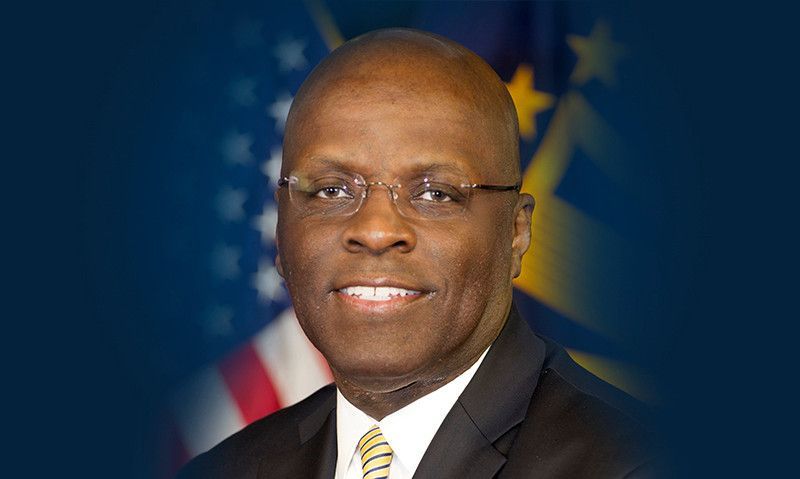
Among the topics discussed at the Veterans Education & Employment Commission meeting at Washington Conference: the challenge veteran business owners face in getting credit and more.
Among the biggest hurdles veteran entrepreneurs must face is access to capital, an issue exacerbated during the COVID-19 pandemic. Finding ways to address that challenge was a point of discussion by several speakers at the meeting of The American Legion’s Veterans Education & Employment Commission on March 5 as part of the virtual Washington Conference.
Keynote speaker Larry Stubblefield, associate administrator at the U.S. Small Business Administration (SBA), said that it became clear to SBA during the pandemic that access to capital became even more of an issue. “We saw not just veteran-owned small businesses, but small businesses in general not being able to access some of the relief programs because of not having a relationship with banks or not being what we call lender-ready,” he said.
The SBA encourages veteran-owned small business owners to draw on the agency’s expertise and assistance to help with accessing local lenders, as well as identifying the best type of capital, the most appropriate loan programs, and how to become lender-ready through creation of business plans, working on credit scores and more.
“We help veterans prepare themselves to sell what they’re doing,” Stubblefield said.
Stubblefield noted that SBA’s Advisory Committee on Veterans Business Affairs has a dedicated subcommittee for access to capital issues and is working on recommendations. Joe Sharpe, director of the Legion’s Veterans Education & Employment Division, is a member of that subcommittee.
The access to capital topic was also broached during an afternoon panel discussion on rebuilding the veteran-owned small business industrial base. William Elmore, the access to capital chairman of The American Legion Small Business Task Force, noted a 2018 study by the SBA and the Federal Reserve Bank of New York that showed veteran businesses have less access to capital than others.
Elmore noted that there is a lack of data on why that is, in part because veterans, servicemembers and their families are not included in the Community Reinvestment Act.
“What this does is preclude us from having the kind of robust data we need so that we can identify what are the barriers to entrepreneurship and access to capital that veterans themselves are enduring,” Elmore said.
Elmore mentioned a potential idea to form a network of volunteer Legion members with knowledge about capital access to assist veteran entrepreneurs.
“They work at banks, they work at savings and loans, etc., and we’d like to see The American Legion, and help if we can, build a network of volunteers who upon request could provide pro bono guidance to young veterans who are seeking access to capital but simply don’t know how to engage with a bank properly,” he said.
Other business
Stubblefield updated the commission on the pending transfer of the Center for Verification and Evaluation of veteran-owned small businesses from the Department of Veterans Affairs to the SBA.
The transfer was part of the 2021 National Defense Authorization Act (NDAA) and will be effective Jan. 1, 2023.
“We’re asking self-certified (service-disabled veteran-owned small businesses) to get certified now,” Stubblefield said. “We know there’s over 21,000 service-disabled veteran-owned small businesses that are registered in SAM (the System for Award Management) that are not currently doing business with the VA … once we’ve transferred the functions to SBA, we’re going to do away with self-certification across the government.”
There is a one-year grace period to file an application for certification through the SBA, i.e. self-certified service-disabled veteran-owned small businesses would have until Jan. 1, 2024, to file an application for certification. Businesses must be certified in order to receive government contracts.
The commission approved a resolution endorsing the change; that resolution will be considered by the National Executive Committee at the Spring Meetings in May.
More details on the CVE transfer are available here.
Stubblefield also discussed the SBA’s efforts to help veteran-owned small businesses access government contracts. In 2020, the federal government exceeded its small business contracting goal by awarding $145.7 billion in contracts to small businesses, with $23.94 billion going to service-disabled veteran-owned small businesses.
Ivan Denton, director of programs for the Department of Labor’s Veterans Employment and Training Service (VETS), discussed the agency’s array of programs for transitioning servicemembers.
He noted that the Department of Defense SkillBridge program and the DOL-funded Employment Navigator and Partnership Pilot will place close to 20,000 transitioning servicemembers this year. “These two programs are and will transform the TAP (Transition Assistance Program) space in the interagency in the next five years,” Denton said.
Information on VETS’ other programs is available here.
Other speakers during the morning session included SkillMil CEO Noel Gonzalez, whose company uses proprietary technology to help ensure that veterans’ skills from their service translate into appropriate civilian careers; and Ricardo Da Silva, program integration officer at the Veterans Benefits Administration, who discussed the GI Bill and the Veteran Rapid Retraining Assistance Program.
Other panels in the afternoon discussed ways to ensure veteran success in education and training, and ways to increase veteran hiring in the federal workforce.
- Washington Conference

